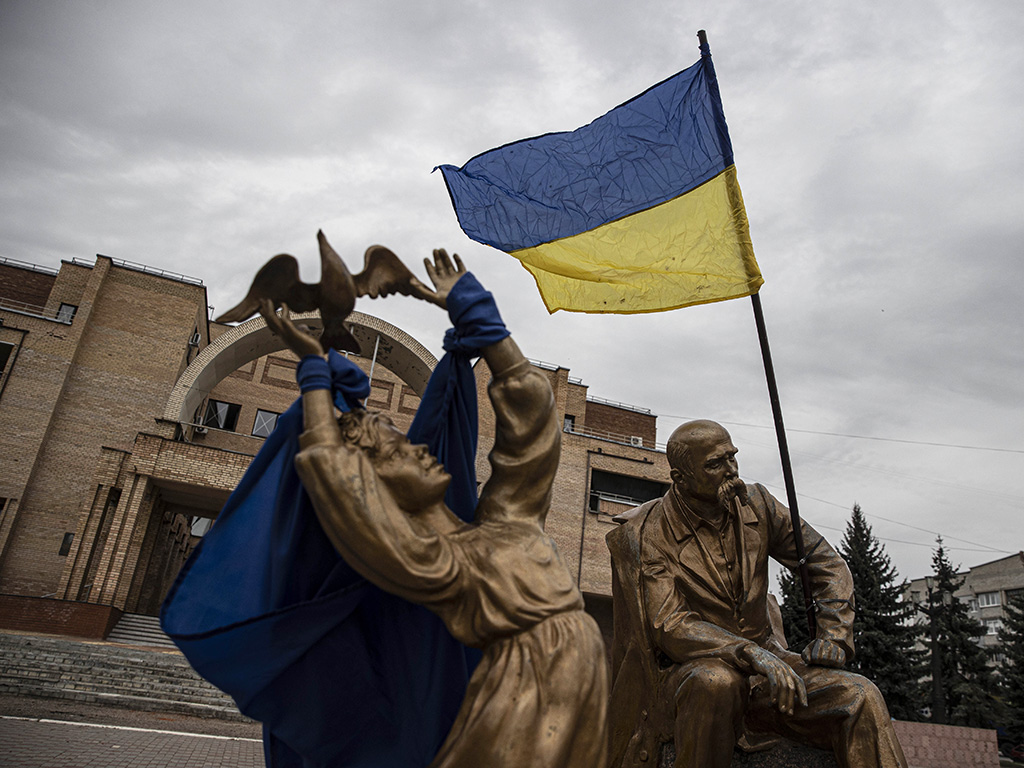
BERLIN – Ukrainian forces continue their lightning advances in the north of the country, liberating towns that had been held by Russian forces for months south-east of Kharkiv. The Institute for the Study of War, a Washington-based think tank, calculates that Ukrainian forces have recaptured more territory in five days than Russia had since April.
Ukraine first captured Balakliya, then pushed forward to capture the key railway hub of Kupyansk and Izyum, according to the Ukrainian president Volodymyr Zelensky. In all, Kyiv claims to have captured some 3,000 square kilometres in the past few days, pushing close to the Russian border in the Kharkiv region. As Russian forces have fled, they have left masses of equipment behind, including tanks and rocket systems, indicating the scale and speed of their rout.
Russian forces appear to have been taken by surprise. This was perhaps because they had redeployed to the south around Kherson in anticipation of a long-announced counteroffensive to recapture that city, one of only a few significant population centres captured by Russia over the course of its invasion.
In Russia, pro-war commentators are seething. Igor Girkin, a nationalistic commentator who played a prominent role in fomenting conflict in the Donbas in 2014 and also known as Strelkov, bitterly railed at “the brilliant… operation to transfer the cities of Izyum, Balakliya and Kupyansk to our respected Ukrainian partners” in a post on the messaging app Telegram.
Russian state TV is openly hosting discussion of the war’s failures in light of the most recent setbacks for their forces. It’s a sharp contrast to the usual delusional threats to “denazify” Nato countries using “the second army in the world”.
Boris Nadezhdin, a former member of the Duma, Russia’s national parliament, said on TV: “It is absolutely impossible to defeat Ukraine” with Russia’s current strategy of refusing to declare a full-scale war, leaving Moscow with the choice of suing for peace or escalating the conflict (a decision Vladimir Putin has been loath to take, preferring a piecemeal “shadow mobilisation”). The significance of Nadezhdin’s appearance lies less in his words and more in the fact that a long-standing (and largely politically insignificant) pro-Western liberal was invited on state TV at all.
The Kharkiv counteroffensive may finally be the signal that gets through to the Russian leadership. Putin may have believed that in time, Russia’s supposedly superior numbers would grind the Ukrainians down and allow Moscow victory. In fact, something like the opposite has happened, with exhausted Russian forces rapidly retreating when probed, their supply lines weakened by months of Ukrainian strikes using US-supplied Himars rocket systems.
The Russian army can now choose only how to lose. The first option is to continue putting off the hard choices and likely carry on suffering military defeats, including further south now that Ukraine has the initiative. The second is for Putin to declare war and enact a full mobilisation. It would take months, however, to train men called up, while Russia is having difficulty equipping the troops it has currently deployed and Ukraine is making gains right now.
The third is for Moscow to seek genuine peace negotiations, although Kyiv’s recent successes on the battlefield may make it more reluctant to settle for limited concessions. The final option would be some kind of drastic escalation, such as the use of nuclear weapons or an engineered radiation leak at the Zaporizhzhia nuclear power plant, although such a reckless gamble would signal Russia’s extreme weakness and further threaten the survival of the regime. It is a delightful irony that the Ukrainian offensive made so much progress in the days leading up to 11 September. It is that date, of course, which had long been mooted for when sham “referendums” on the annexations by Russia of the Luhansk, Donetsk, Zaporizhzhia and Kherson regions would be held. The Armed Forces of Ukraine cast their vote early.
This article first appeared in the World Review newsletter. It comes out on Mondays and Fridays; subscribe here.
[See also: Why China won’t ditch Vladimir Putin]





